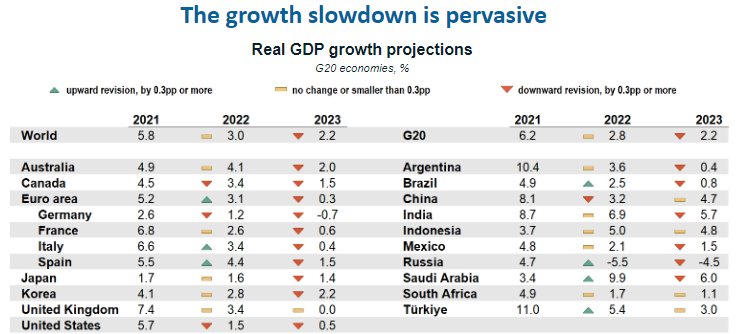World GDP has been affected by the Russian invasion of Ukraine and its growth stalled in the second quarter of 2022, the OECD reported.
Now, indicators in many economies point to a prolonged period of subdued growth.
Indeed, the war has pushed up energy and food prices substantially, exacerbating inflationary pressures at a time when the cost of living was already rising rapidly around the world.

The OECD expects global GDP growth to slow from 3% in 2022 to 2.25% in 2023, well below the pace forecast before the war.
From its perspective, real world income in 2023 could be about $2.8 trillion less than projected a year ago (a shortfall of just over 2% of GDP in PPP terms).
In particular, the OECD projects annual GDP growth to slow sharply to 0.5% in the United States in 2023, and 0.25% in the Eurozone, with downside risks to output in several European economies during the winter months.
World GDP
At the same time, the OECD forecasts growth in China to fall to 3.2% this year, amid Covid-19 closures and weakness in the property market, but policy support could help growth recover in 2023.
Inflation has become more widespread in many economies. Tighter monetary policy and easing supply bottlenecks should moderate inflationary pressures next year, but high energy prices and rising labor costs are likely to slow the pace of decline.
In this regard, the OECD forecasts headline inflation to fall from 8.2% in 2022 to 6.5% in 2023 in G20 economies, and to decline from 6.2% in advanced G20 economies this year to 4% in 2023.
The projections are surrounded by great uncertainty. Further fuel shortages, especially of gas, could reduce growth in Europe by a further 1.25 percentage points in 2023, and global growth would be reduced by 0.5 percentage points, and increase European inflation by more than 1.5 percentage points.
Risks and support
For the OECD, further interest rate hikes are required in most major economies to anchor inflation expectations and ensure a lasting reduction in inflationary pressures.
It also believes that fiscal support is needed to help cushion the impact of high energy costs on households and businesses.
However, this should be temporary and governments should focus on the most vulnerable, preserve incentives to reduce energy consumption and withdraw when energy price pressures ease.
The aftermath of war remains a threat to global food security, especially when combined with new extreme weather events resulting from climate change.
![]()

